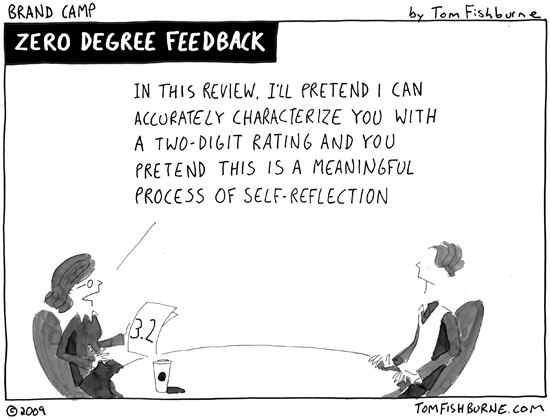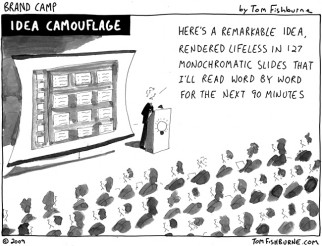Performance reviews can be incredibly dehumanizing. I recently stumbled across this telling depiction from software luminary, Joel Spolsky:
First, you gave “anonymous” upward reviews for your direct manager (as if that could be done in an honest way). Then, you filled out optional “self-evaluation” forms, which your manager “took into account” in preparing your performance review.
Finally, you got a numerical score, in lots of non-scalar categories like “works well with others”, from 1-5, where the only possible scores were actually 3 or 4.
Managers submitted bonus recommendations upwards, which were completely ignored and everybody received bonuses that were almost completely random.
The system never took into account the fact that people have different and unique talents, all of which are needed for a team to work well.
Joel recommended doing away with performance reviews entirely. He quoted an HBR article which described one of the outcomes of performance reviews as "teamicide".
Nobody wants "teamicide," but I don't want to ditch the process entirely. I've been thinking about how to redefine performance reviews in a way that could actually be meaningful (and not feel like something out of The Office or Office Space). Because I do think it's essential to share and receive feedback with a team.
I've experimented with two simple things recently that seemed to work well as part of the process.
We ordered copies of a book called StrenghFinder for everyone in our office. It comes with a link to an online assessment which tells you your top strengths. We spent an hour sharing our strengths with each other. It was actually really interested to see what you had in common and what was unique And it felt positive to focus on all of those differences as strengths, instead of just harping on "development areas".
We then did away with anonymous 360 feedback, and instead asked everyone to meet one-on-one. Over coffee, everyone gave and received feedback on what each other should "continue, start, and stop". I picked that up when I was at Dreyer's (part of Nestle), and I found it much more meaningful and less passive aggressive than the standard anonymous process. It actually brought a lot of good stuff to the surface and you had the chance to probe for more.
Rather than once a year, I think we're going to do some form of it every three months or so. Makes it less formal and artificial. We'll see how it goes.



Gail Gardner says
When IBM introduced 360 feedback I almost resigned then. It couldn’t help you and it definitely could hurt you. Such a ridiculous idea. No one can make everyone happy. It was particularly difficult for me, because I was the lone shift person. The mainframe techs wanted me to work as late as possible because they didn’t want to get called back in. The AS400 people wanted me to work days because almost all their customers did and they didn’t want to cover anything that wasn’t attached to their systems. No way I could make both groups happy – and the hours I worked were not even set by me but by our manager.
Making your co-workers happy should never be our job description. Yes, assist them all you can – but teamicide is a good definition of what something-360 does. (Can’t remember what they called it – too many years ago now. PBC360?)